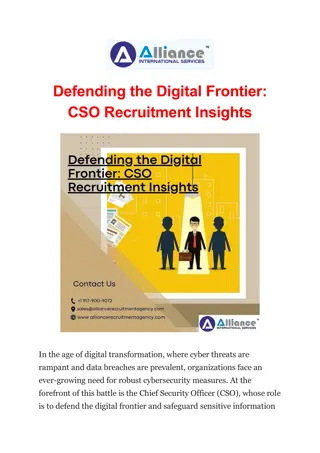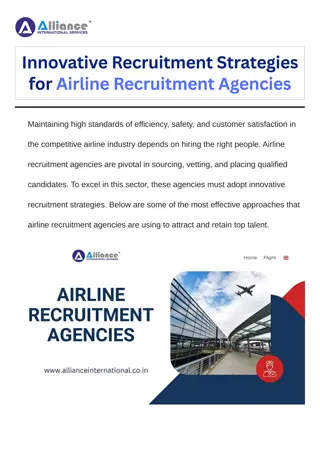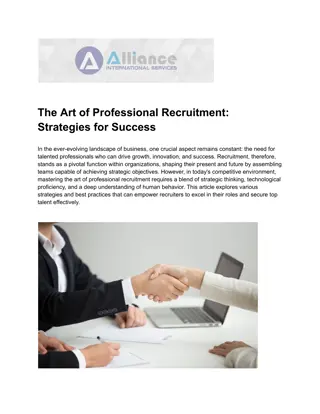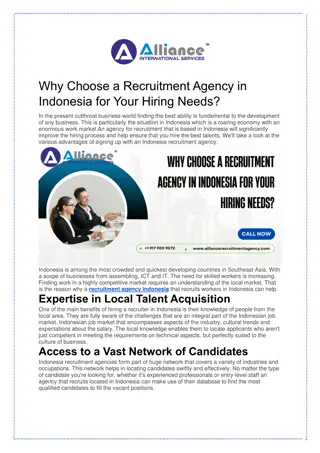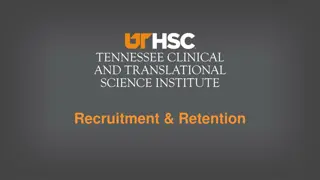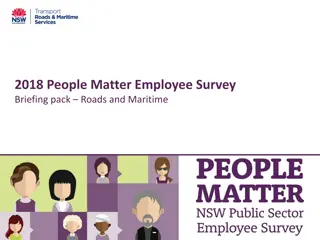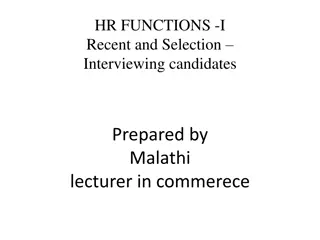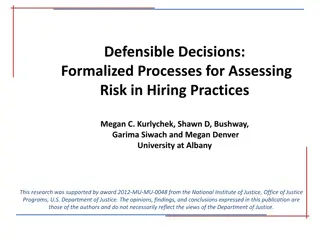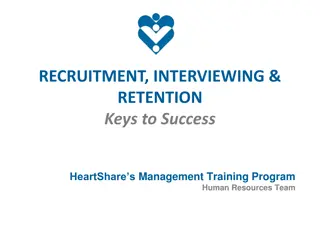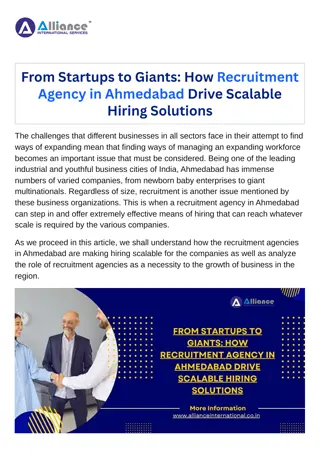USG Employee Recruitment Policy Updates and Hiring Procedures
The University System of Georgia (USG) has introduced new Employee Recruitment Policy updates effective July 1, 2023, impacting criteria for employment and policy on freedom of expression. The revised policies emphasize academic freedom, diversity of thought, and protection of staff and faculty rights. Recruitment processes align with institutional missions, focusing on candidate qualifications, knowledge, and skills assessment. Hiring managers must follow specific responsibilities, including job description reviews, critical vacancy requirements, and validation of job-related qualifications. Compliance with USG values and equal employment opportunity is essential in recruitment advertising.
Download Presentation

Please find below an Image/Link to download the presentation.
The content on the website is provided AS IS for your information and personal use only. It may not be sold, licensed, or shared on other websites without obtaining consent from the author. Download presentation by click this link. If you encounter any issues during the download, it is possible that the publisher has removed the file from their server.
E N D
Presentation Transcript
RECRUITMENT PROCESS RECRUITMENT PROCESS & EMPLOYMENT & EMPLOYMENT REQUIRED TRAINING REQUIRED TRAINING
AGENDA Background Policy 6.5: Freedom of Expression and Academic Freedom USG Recruitment Policy Updates & Changes Recruitment & Hiring Process and Procedures Criteria for Employment Questions & Answers
BACKGROUND Effective July 1, 2023, the USG has drafted and implemented a new Employee Recruitment Policy. The General Criteria for Employment policy has been revised. There was also a revision of Policy 6.5 Freedom of Expression and Academic Freedom. These revisions apply to ALL USG institutions. All USG Presidents and CHRO are required to attest to the university s compliance to and implementation of the new guidelines.
6.5 FREEDOM OF EXPRESSION AND ACADEMIC FREEDOM The Board of Regents of the University System of Georgia (USG) approved a statement of principles in April of 2023 that affirm and protect academic freedom and freedom of expression for students, faculty and staff at its 26 public colleges and universities. The principles assert the board s commitment to academic freedom. They also affirm that USG values the diversity of intellectual thought and expression among students and faculty as well as the need for faculty to be unburdened by ideological tests, affirmations and oaths.
RECRUITMENT PROCESSES AND PROCEDURES Screening Requirements and Data Collection Recruitment should be based on institutional need and the availability of resources to fulfill the mission of CSU. A screening and selection framework to assess the qualifications, knowledge, and skills of candidates will be established. Departmental units should not develop or institute mission or value statements that are not aligned with and in support of the overall Institutional mission and values. Key Points: 1. Goal is to determine whether or not the candidate can perform the stated duties of the role. 2. No department should have mission or value statements that are not aligned with overall institutional mission and values.
HIRING MANAGER RESPONSIBILITIES 1. Identify the need for the opening and review and modify job description as needed. Human Resources approval will be required if there are new functions added to a job or significant reorganization of a business area. 2. Complete required Critical Waiver and Critical Vacancy requirements prior to posting. 3. Job requirements such as minimum and preferred qualifications are considered selection tests and must be validated by human resources to ensure they are job related and consistent with business necessity. 4. Develop position posting in coordination with Human Resources. The job advertisement should also include and be consistent with the USG Statement of Core Values and Institutional Values and Equal Employment Opportunity requirements. (Reference BOR (Board of Regents) Policy 6.5 Freedom of Expression) 5. Select appropriate recruitment source(s) (external or internal) for posting the opening and decide on the selection stages and timeframe.
HIRING MANAGER RESPONSIBILITIES 6. Internal jobs postings should remain open for a minimum of three (3) business days. 7. External job posting should remain open for a minimum of five (5) business days. 8. Review resumes collected via the Institution s applicant tracking system (ATS) and identify the most qualified candidate to move to the next phase of the selection process. 9. Proceed through the screening and selection stages (including reviewing candidate s application materials, conducting interviews, verifying references, etc.) and select the most suitable candidate. 10. Work with HR regarding internal or transfer applicants as it relates to eligibility for rehire. 11. Consult with HR and CSU General Counsel if social media will be used as part of the hiring process. Note: Standardized rubric and questions should be used in selection process. More information forthcoming from Human Resources (rubrics, etc.).
CANDIDATES SHALL NOT BE REQUIRED TO 1. Submit to any political litmus tests or ideological oaths. 2. This includes personal statements related to diversity or supporting specific populations, as part of the employment process. Note: Institutions may include appropriate scenario-based questions during the interview process to collect information related to specific experience supporting specific student populations when it is directly correlated and relevant to the duties associated with the role.
RECRUITMENT TRAINING REQUIREMENTS 1. All employees responsible for recruiting and hiring or serving on a search committee must complete the approved CSU Search Committee Training. 2. Department CANNOT created and deliver their own training related to recruitment/search committees. 3. All training performed by the Institution must be approved by Institution s Chief Human Resources Officer ( CHRO ) and the Institution s President. 4. Training records will be maintained of all employees that have completed training.
DIRECT APPOINTMENT RULES A direct appointment refers to the regular appointment of a person, where the normal advertising and competitive selection process is not applied. Nominations and recommendations for direct appointments of staff or faculty can be made by a Vice President (or comparable senior level administrator and above. Direct appointments must be approved by the CHRO and the President. Direct appointments may be possible as part of the hiring process to: appoint an internal candidate with relevant knowledge, skills and experience who uniquely meets the requirements and criteria for the role as specified in the position description; appoint an external candidate with significant leading status or international recognition in their field or a rare, exceptional skillset; or appoint a candidate who was a previous applicant for the same or similar position within the past 12 months.
DIRECT APPOINTMENT RULES All nominations or recommendations for appointments under this procedure shall contain the following information and require the relevant approval prior to commencing the appointment process: the written rationale for the appointment, explaining why a direct appointment process is preferable to a standard, competitive recruitment process; satisfactory evidence of how the proposed appointee meets the qualifications and possesses the requisite knowledge, skills and abilities as delineated within the position description; rationale explaining how the appointment is expected to contribute to the Institutions strategic vision; the candidate s CV or resume, qualifications, appropriate references, and details of their current position (if applicable) within another organization or Institution. Upon approval, all applicable employment processes must be completed (background check, etc.).
DIRECT APPOINTMENT RULES Please note it is the Institution s responsibility to use this option judiciously and ensure that all requirements are met and recorded for audit, as requested by internal or external agency requests. Prior to approval of the appointment, all information and supporting documentation as referenced above must be submitted to the Office of Human Resources. Whenever the discretion not to advertise is exercised in accordance with this procedure, care must be taken to: Ensure that there is no other member of staff in the Institution, and in particular, the Department or School concerned, who could be deemed a suitable candidate for the position. Where this may be the case, it is recommended that the role is advertised internally, allowing all staff to be equitably considered for the role.
GENERAL CRITERIA FOR EMPLOYMENT POLICY All USG employees must meet the terms and conditions of employment required: Job-related qualifications (e.g. valid license/certification) Safety protocols Required training Required employment processes (background check, etc.) A USG employee whose job duties include working with a third-party organization that has an active contract with the USG must meet the requirements for successful performance on the job as established by that third-party organization.
GENERAL CRITERIA FOR EMPLOYMENT POLICY Prior to completing the selection process, the institution s Office of Human Resources or designated official must complete the following actions: Review (1) any credentials the candidate is required to possess as terms and conditions of employment; (2) the reasons for the candidate s separation from previous employment; and (3) responses to whether the candidate has ever been fired or forced to resign or whether the candidate resigned in lieu of potential disciplinary measures that may have been taken (see HRAP provisions on Eligibility for Rehire). Conduct appropriate reference checks as necessary to verify employment and/or obtain job related information that will assist in determining the candidate s qualifications and suitability for the intended position. Complete an academic and professional credentials check for applicable positions in accordance with accreditation and professional standards and requirements. Employment of Nonresident Foreign Nationals must comply with all applicable federal laws, stipulations, and restrictions.
NEW EMPLOYEE REQUIREMENTS: Must meet the qualifications of the job and terms of conditions of employment. Successfully complete a background investigation appropriate to the position to which the individual is being hired. Complete and sign the Security Questionnaire and Loyalty Oath as required and defined in Georgia Codes. This form shall be prepared in original copy only, notarized, and filed appropriately at the relevant institution. File Federal and Georgia tax withholding forms. Enroll in a USG retirement program or the Georgia Defined Contribution Plan as required based on employment status. Complete Form I-9 within three (3) days of employment. Employees are required to maintain authorization to work in the United States. for the duration of their employment, including re-certification, as necessary. Complete required training as required by the USG and the employee s institution within the specified timeframe. Complete all other forms that may be required per USG or institutional policy Disclose actual or apparent conflicts of interest.
CURRENT EMPLOYEE OBLIGATIONS: Maintain all terms and conditions of employment. Institutions must complete background investigations on current employees being transferred, reassigned, reclassified, or promoted into positions of trust and take any appropriate actions based on the investigation outcome. Any current employee charged with a crime (other than a minor traffic offense) shall report being charged with such crime to the employee s institutional Office of Human Resources within 72 hours of becoming aware of such a charge. Any current employee convicted of a crime (other than a minor traffic offense) must report such conviction to the employee s intuitional Office of Human Resources within 24 hours of the conviction. Employees should follow the procedures established at their institution to disclose potential, actual, or apparent conflicts of interest and gain approval for compensated outside activities. Reference HRAP provision on Conflicts of Interest, Conflicts of Commitment and Outside Activities. New and current employees are required to complete training at orientation and yearly as mandated by the institution. This includes Right to Know, Cybersecurity, Ethics, and other mandatory training identified by the institution.






